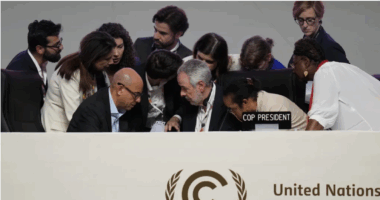Climate, Health and Equity Brief
Toxic rice, dirty air and premature aging: climate’s unequal health toll
May 5, 2025

The Climate, Health & Equity Brief is GMMB’s take on the latest news on the current impacts of climate change. If you haven’t subscribed yet, you can do so by clicking here.
Hot Topic: Vital signs. New reports released in April continued to confirm that the health impacts of climate change are growing more immediate, widespread, and inequitable.
A study in The Lancet Planetary Health shows that as temperatures rise and extreme weather intensifies, blood donations decline just as demand increases, putting emergency care at risk. Another Lancet study finds that climate change is raising arsenic levels in rice—a dietary staple for billions—increasing global cancer risk, especially for communities already facing food insecurity and pollution.
In the U.S., rising heat is compounding existing health threats. Research shows that extreme temperatures can accelerate aging and heighten the risk of diseases such as Alzheimer’s, with women and people with obesity or Type 2 diabetes most affected due to vulnerabilities like impaired circulation and reduced ability to regulate body temperature.
Meanwhile, air quality is deteriorating. The American Lung Association’s 2025 State of the Air report finds that 156 million Americans—nearly half the U.S. population—live in counties with failing grades for ozone or particle pollution, a direct consequence of warming, drought and wildfires. The burden falls hardest on those in predominantly Black, Brown, and low-income neighborhoods historically situated near sources of pollution.
Yet as health threats mount, the Trump administration has halted critical NIH research into climate-linked health concerns like Alzheimer’s, infectious illness, and heat-related cardiovascular strain—effectively pulling the plug on science that could save lives. The EPA has also confirmed it will cancel 781 environmental justice grants, cutting over $1.5 billion in funding meant to help communities of color build climate resilience.
The pattern is clear: the climate crisis is not only destabilizing ecosystems—it is threatening the conditions required for a healthy life, especially for vulnerable populations. Just as the need for research, data, and coordination grows, climate science is facing backlash, public information is disappearing and funding is drying up. The consequence isn’t just scientific uncertainty—it’s a widening health divide in a dangerously warming world.
Human Health
A new global study in The Lancet Planetary Health finds that climate change is disrupting the world’s blood supply by simultaneously increasing demand during extreme weather events and decreasing donations and delivery capacity, posing serious risks to public health. (The New York Times)
Another new study in The Lancet Planetary Health warns that climate change is driving a sharp increase in toxic inorganic arsenic in rice, the world’s most consumed grain, posing escalating cancer and health risks for billions, especially in rice-dependent communities, by mid-century. (Grist)
The Trump administration’s cuts to NIH climate-health research have abruptly halted key studies on Alzheimer’s, extreme weather, and disease risk—undermining public health and scientific progress as climate threats grow. (The New York Times, Mother Jones)
The American Lung Association’s 2025 State of the Air Report found that 156 million Americans live in areas with failing grades for ozone or particle pollution levels, finding that climate change is making it harder to protect air quality gains. (E&E News)
Recent studies have found that extreme heat may accelerate the aging process and increase the risk of age-related diseases, with women and people with obesity facing greater vulnerability due to differences in heat tolerance, blood flow, and cardiovascular strain. (Yale Climate Connections)
The European State of the Climate Report found that in 2024, extreme weather affected more than 400,000 people in Europe, killing at least 335 people and costing €18 billion in damages on the fastest-warming continent. (Euronews)
Planetary Health
In 2024, atmospheric carbon dioxide concentrations surged by a record-breaking 3.7 parts per million, a major NOAA finding raising concerns that Earth’s natural carbon sinks are weakening and global warming may accelerate faster than expected, a conclusion the Trump administration downplayed. (E&E News)
According to a new report, the duration of heatwaves in the world’s oceans has tripled due to human-driven climate change, with warmer oceans destroying critical aquatic ecosystems, intensifying storms and increasing global temperatures. (The Guardian)
Recent wildfires in New Jersey mark a turning point for the Northeastern U.S., as climate change, drought, forest mismanagement and federal funding cuts expose a growing vulnerability to large-scale wildfires that was once considered unique to the Western U.S. (Grist)
Equity
A new report finds that women, especially young, Black and Indigenous women, now make up nearly 62% of climate-first voters, widening the gender gap on environmental issues as they now outnumber men in ranking climate change as their top concern when voting. (The 19th)
As Arctic temperatures rise nearly four times faster than the global average, melting sea ice and disrupted ecosystems are fueling a mental health crisis by deepening food insecurity, cultural loss, and mental health struggles among Greenland’s Inuit, who already face one of the world’s highest suicide rates. (Inside Climate News)
A new report found that while Indigenous Peoples make up 6% of the global population, they safeguard 80% of the planet’s remaining biodiversity but receive less than one percent of international climate funding. (UN News)
A new court filing reveals that the EPA plans to cancel 781 environmental justice grants, which jeopardizes over $1.5 billion in climate resilience projects aimed at protecting vulnerable communities from threats such as wildfires and coastal flooding. (The Washington Post)
A lawsuit filed in federal court in South Carolina argues that the Trump administration violated the free-speech rights of nonprofits and municipalities by targeting them over verbiage like “equity” or “socioeconomic” in their grant documents. (NPR)
Politics & Economy
Administration Watch:
- The U.S. Department of Agriculture has canceled a $3 billion program for climate-smart farming projects. (Reuters)
- A draft White House proposal recommends slashing NOAA’s 2026 budget by 25% by eliminating its climate, weather, and ocean research programs. (CBS News)
- The Trump administration has halted construction of a major wind farm off New York’s coast that would have created more than 1,500 jobs and powered 50,000 homes. (The Guardian)
- The EPA has confirmed that 280 employees from the Office of Environmental Justice and External Civil Rights will be laid off by July 31, 2025, and an additional 175 will be reassigned. (Inside Climate News)
- The Trump administration’s cuts to the Forest Service, which oversees wildfire disasters, have sparked fury and fear in at-risk states where the service is now understaffed. (POLITICO)
- The State Department is permanently closing the Office of Global Change, which is responsible for international climate change negotiations on behalf of the United States. (POLITICO)
- A proposed Trump administration rule would strip habitat protections from the Endangered Species Act by redefining “harm” to exclude habitat destruction. (AP News)
- The Trump administration has dismissed the 400 scientists responsible for developing Congress’s mandatory National Climate Assessment. (The New York Times)
Through bold moral leadership and landmark writings like Laudato Si, Pope Francis transformed the Catholic Church’s stance on climate change—aligning faith with environmental action, challenging global powers, and uniting over a billion followers behind a call to protect “our common home.” (CNN)
A new Media Matters study found that corporate broadcast networks aired 25% less climate coverage in 2024 compared to 2023, with extreme weather dominating the coverage but climate change mentioned in only 31% of those segments. (Forbes)
A new analysis reveals that greenhouse gas emissions from U.S. liquefied natural gas (LNG) tankers exceeded the annual climate benefits of every electric vehicle on U.S. roads in just one year—underscoring the hidden climate toll of America’s booming gas export industry. (Inside Climate News)
Due to a federal funding lapse, four of NOAA’s six Regional Climate Centers—serving key agricultural and weather-dependent regions—went offline, disrupting access to critical climate data amid proposed budget cuts of $1.67 billion to NOAA’s programs. (KXAN Austin)
A new study projects that climate change could cause U.S. federal corn crop insurance claims to rise by up to 22% by 2030 and 29% by 2050 due to increasingly severe droughts, floods, and heatwaves. (The Hill)
Action
Paris’ decision to prioritize bike lanes, add green space, and eliminate 50,000 parking spaces has dramatically increased air quality within the city, with fine particulate matter decreasing 55% and nitrogen dioxide levels falling 50% in the last twenty years. (The Washington Post)
A Trump-appointed judge ruled that the Trump administration must unfreeze billions of climate funding dollars initially frozen on the first day of the Trump presidency. (The Washington Post)
Environmental groups have sued the Trump administration for removing federal web tools to track climate and pollution risks in disadvantaged communities, arguing the action unlawfully erases critical public data and undermines environmental justice efforts. (Inside Climate News)
Teachers and state leaders across the U.S. are pushing forward on climate change education despite federal defunding and data suppression, aiming to close the knowledge gap among students who are increasingly misinformed about the crisis. (KQED)
Life as We Know It
A new study finds that although most Americans believe climate change is a serious threat, many mistakenly think they’re in the minority and underestimate how widely their views are shared, hindering public conversations that lead to collective action to address the climate crisis. (The Hill)
Warming temperatures and changing weather patterns are enabling disease-carrying mosquitoes to thrive in more regions across the U.S., putting pets at greater risk of heartworm and other infectious diseases that were once considered rare. (Inside Climate News)
Some of the world’s most popular foods—including Madagascar’s vanilla, California’s almonds, and Mexico’s agave—face potential extinction as climate change disrupts the environmental conditions they depend on and threatens their availability in the future. (Saveur)
Kicker
Check out the Climate Mental Health Network’s downloadable climate grief resources, including one-pagers, activity guides, videos and guides for talking with children and youth.
Our common home is being pillaged, laid waste and harmed with impunity. Cowardice in defending it is a grave sin.”
– Pope Francis
The GMMB Climate, Health & Equity Brief would not be possible without the contributions of the larger GMMB team—Catherine Ahmad, Aaron Benavides, Stefana Hendronetto, Nikki Melamed, Sharde Olabanji, Kenzie Perrow and Marci Welford. Feedback on the Brief is welcome and encouraged and should be sent to [email protected].




